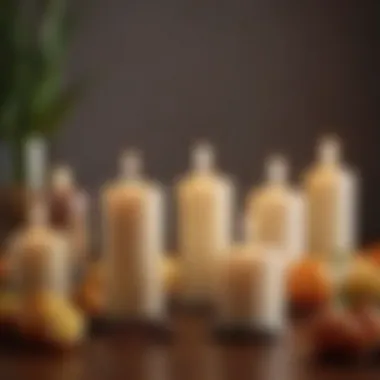What to Bring to a Funeral: A Comprehensive Guide


Intro
Attending a funeral is a solemn event that requires sensitivity and understanding of various customs and practices. The emotional weight of the occasion makes it vital to approach the event with care and respect. Knowing what to bring can ease the burden on attendees, allowing them to focus on paying their respects rather than worrying about what they should or should not have brought. It helps to understand both traditional expectations and modern sensibilities when it comes to these events.
This guide will cover the essentials to consider when selecting items for a funeral, from attire to personal mementos. By being informed, you can ensure that your presence contributes positively to the atmosphere, making it respectful and meaningful for both yourself and the bereaved.
Key Points to Consider
Before diving into specifics, it is useful to understand a few key aspects:
- Cultural Sensitivity: Different cultures and religions have various practices associated with funerals. Be aware of the customs relevant to the deceased’s background.
- Attire: Dressing appropriately is crucial. What you wear can communicate your respect for the occasion.
- Personal Items: Items like condolence cards, flowers, or even food for the grieving family can convey support.
- Emotional Preparedness: Being mentally ready for the environment is essential. Funeral settings can evoke strong feelings, so be prepared to address your emotions while maintaining respect for others.
"Presence at a funeral is not just about being there; it's about being respectful and understanding the moment you're part of."
In the following sections, we will explore these aspects in detail, helping you understand what specific items to consider bringing and how they may contribute to the overall atmosphere of respect and support.
Intro to Funeral Etiquette
Understanding funeral etiquette is essential for anyone attending a funeral. It sets the tone for the event and helps dictate the behavior expected from the attendees. The importance of being mindful of funeral customs cannot be overstated. This awareness allows participants to show respect for the deceased and their loved ones while also navigating the often challenging emotional landscape of grief.
One of the key aspects of funeral etiquette is the notion of respect. Adhering to the established norms showcases an understanding of the gravity of the situation. Attendees can convey their support and solidarity with the bereaved family by planning their presence with consideration.
Another critical element is cultural awareness. Different cultures have unique customs surrounding death and mourning. Familiarizing oneself with these practices can prevent unintentional faux pas. For instance, some cultures may prefer a somber atmosphere, while others may celebrate life through joyous expressions. Being attuned to these differences demonstrates sensitivity and thoughtfulness.
In addition to cultural practices, understanding the emotional landscape at a funeral is vital. Grief manifests differently among individuals. Thus, knowing how to behave, what to say—or what not to say—can make a significant positive impact. Here are some considerations that highlight the benefits of understanding funeral etiquette:
- Awareness of Dress Codes: Each funeral may have specific attire expectations that reflect the wishes of the deceased's family or cultural practices. Wearing appropriate clothing shows respect.
- Meaningful Support: Offering condolences or thoughtful gestures, such as bringing flowers, can provide comfort to grieving individuals.
- Avoiding Awkward Situations: By knowing what topics to avoid, attendees can minimize discomfort and maintain a respectful environment.
Ultimately, mastering funeral etiquette allows attendees to fulfill their role respectfully. This guide aims to equip individuals with knowledge on what to bring to a funeral and how to conduct themselves. Familiarity with these practices helps to ease the burdens of grief and foster an atmosphere of support during difficult times.
"Attending a funeral is not just about honoring the deceased; it is also about being present for those who remain."
This comprehensive guide will delve into essential considerations, from attire to cultural customs, ensuring attendees are prepared for this sensitive occasion.
Understanding the Importance of Presence
Attending a funeral is a significant act that transcends mere obligation. It conveys respect for the deceased and offers comfort to those in mourning. The presence of friends and family during such a time can have a profound emotional impact. This section will delve into the essential elements and benefits that underscore the importance of presence at a funeral.
When individuals come together in shared grief, it fosters a sense of community. This collective experience can help attendees process their own emotions. The very act of being there, often without words, speaks volumes. Your presence alone can reassure the bereaved that they are supported during this difficult time.
Moreover, presence allows for an atmosphere of connection. Funerals often stimulate conversations that honor memories and shared experiences with the departed. Engaging with others can offer solace, as people reflect on the life of the deceased. Each attendee brings a piece of their relationship with the individual who has passed, creating a tapestry of memories that can aid in the healing process.
In a practical sense, showing up also serves to acknowledge the family’s loss in a tangible way. It demonstrates empathy and solidarity. Many cultures emphasize the importance of mourning rituals, and being present is often a crucial aspect. It reflects an understanding of the individual’s customs, enhancing the experience for both the bereaved and the attendees.
The Emotional Role of Attendees
Attendees play a pivotal role at funerals, serving as emotional anchors for one another. Each individual brings their own history and connection to the deceased, offering varied perspectives on their life. This diverse portrayal can be both comforting and uplifting for those mourning.
Benefits of Attendees’ Emotional Support:
- Companionship: Offers comfort amidst pain.
- Collective Memory: Sharing stories can help in remembering the good times.
- Empathy: The ability to share in another’s grief fosters deeper connections.


The emotional landscape during a funeral is complex. Attendees may experience a mix of sorrow, fondness, and even celebration of life. Engaging with these emotions collectively can facilitate healing and understanding.
"The presence of others during a time of loss can ease the journey through grief. It is not just about saying goodbye; it is also about leaning on each other."
Understanding the role that attendees play prepares them to engage effectively and compassionately. By being mindful of the emotional needs of those around them, attendees can contribute positively to the atmosphere of remembrance and support.
Essential Items to Consider
When attending a funeral, certain items are essential to ensure your presence is respectful and considerate of the situation. The act of bringing specific items can demonstrate support to those grieving and help you navigate the customs of the event. It is important to be mindful of what to bring, as it signifies thoughtfulness and understanding of the circumstances.
Appropriate Funeral Attire
Choosing the right clothing is integral at a funeral. Attire should reflect the somber nature of the occasion. Dark colors such as black, navy, or charcoal are often preferred. These colors convey respect and sympathy. It is essential that clothing is conservative and modest. Avoid bright colors and flashy accessories, which can be seen as disrespectful. Having comfortable yet appropriate footwear is another consideration, as funerals can sometimes involve prolonged standing or walking. In summary, opt for attire that embodies respect and aligns with the funeral’s atmosphere.
Flowers and Sympathy Gifts
Bringing flowers or a sympathy gift is a traditional gesture that can provide comfort. Choosing the right arrangement or plant can carry significant meaning. For instance, white lilies symbolize purity, while roses can express love and remembrance. Make sure to consider any family preferences or cultural customs regarding floral arrangements. Alongside flowers, other gifts such as memorial stones or personalized items can show empathy. When offering these items, it is often appreciated to include a short note explaining your sentiments.
Personal Note or Card
A personal note or card is a thoughtful addition that can greatly resonate with the bereaved. This small gesture allows for individual expressions of care and concern. A message can include cherished memories, condolences, or expressions of your feelings towards the deceased. Written in simple yet sincere language, such a card reinforces the bond between you and the grieving family. Remember to keep it brief and heartfelt, as this will better convey your support during their difficult time.
Food or Beverages for Gathering
Food offerings can play a significant role during gatherings following a funeral. Attendees often share meals to connect and support each other. If you are bringing food, consider items that are easy to prepare and serve. Dishes like casseroles, fruit platters, or baked goods can be appropriate options. Additionally, offering drinks, such as tea or coffee, can be welcomed as people gather to share stories or reflect. It is crucial to check with the family about any dietary restrictions or preferences before you contribute.
Cultural Considerations in Funeral Practices
Cultural considerations play an essential role in funeral practices. Each culture has its own beliefs, rituals, and customs regarding death and mourning. Understanding these varied practices contributes to a respectful attendance at funerals. Being aware of cultural differences ensures that attendees honor the memory of the deceased appropriately and support bereaved families in ways that align with their traditions.
The importance of this topic cannot be overstated. Attending a funeral in a different cultural context—perhaps a community with which one is not familiar—can present challenges. Missteps may arise from simple misunderstandings. Thus, acknowledging these cultural nuances is critical for fostering respect and empathy. It allows attendees to express their condolences without causing unintended offense.
Understanding Different Cultural Norms
Different cultures have unique mourning practices and funeral etiquette. For instance, in some Eastern cultures, wearing white instead of black is a sign of mourning. Additionally, in Judaism, it is customary to cover mirrors and sit shiva for seven days after the burial. In contrast, many Western cultures associate black clothing with funerals, symbolizing sorrow and respect.
Participants may also notice differing burial traditions. Some cultures may practice cremation, while others might prefer body interment. Offerings and rituals may depend heavily on cultural backgrounds. Therefore, if invited to a funeral, consider researching the specific practices of the community. Functions like prayers, songs, or rituals might be expected, and knowing about them can be beneficial.
Religious Implications
Religion often complements cultural norms surrounding funerals, adding another layer of significance. Different religions provide various frameworks for mourning and memorializing the deceased. For example, in Christianity, funeral services may include hymns, scripture readings, and eulogies as part of the Mass or service. In contrast, Islamic rites often encompass a quick burial, following the practices outlined in the Quran.
Understanding these religious implications aids in demonstrating respect. Attendees should research the specific religious customs of the family experiencing a loss. It is also prudent to avoid actions that may be interpreted as disrespectful. For example, certain religious contexts discourage taking photographs during ceremonies or funerals.
When attending a funeral from another culture or religion, one should consider reaching out beforehand to confirm what is appropriate to bring or partake in. This preparation enhances the experience, helping to create a supportive environment for the grieving family.
"Cultural and religious awareness in funeral practices can help attendees navigate complex emotional landscapes, ensuring that respect is paid to both the deceased and their loved ones."
In summary, cultural and religious considerations are key facets of funerary practices. They shape how individuals mourn and commemorate life. By approaching these customs with knowledge and understanding, attendees can contribute to a more meaningful experience for all involved.
Preparing Emotionally for the Event


Preparing emotionally for a funeral is crucial. The atmosphere can be heavy, filled with sadness and reflection. Understanding that many attendees share similar feelings can provide a sense of collective mourning. Recognizing this shared experience aids in acceptance of one's own emotions. It can be beneficial to engage in self-reflection before attending. This practice may help one process their feelings of grief or loss better.
Managing Personal Grief
Grief manifests in various forms, and everyone experiences it differently. Understanding personal grief is the first step toward managing it. Emotions can range from sorrow to anger, and sometimes guilt may appear unexpectedly. A crucial consideration is allowing oneself to feel these emotions without judgment. Writing in a journal might also help articulate these feelings, providing an outlet for the emotions that may feel overwhelming.
Engaging in mindfulness techniques can be effective. Deep breathing exercises or meditative practices can ground thoughts and alleviate anxiety. Additionally, reaching out to trusted friends or family for support can foster a sense of connection. Sharing experiences with others who understand can be comforting and may lessen the feeling of isolation during this time of mourning.
Supporting Others in Grief
While managing personal grief is important, equally significant is the support offered to others. At a funeral, many will be confronting their own feelings of loss. Providing emotional support can strengthen bonds among attendees. Listening attentively to others' stories and emotions is a simple yet profound way to show support.
Being present during conversations can also help others process their grief. A comforting presence, even in silence, can speak volumes. Participants should remember that asking open-ended questions may encourage people to share their experiences, easing their burden.
At times, bringing small gestures of kindness can also be thoughtful. A simple note expressing sympathy or a small token can brighten someone's day, even in their sorrow. Reflecting on how to best support those around you can create a more compassionate atmosphere for everyone at the event.
"Grief, if allowed to flourish, can turn into compassion for others' sufferings."
Overall, preparing emotionally for attending a funeral defines the experience both for oneself and for others. Recognizing and managing personal grief while being a source of support for others can profoundly impact the collective experience during such difficult times.
Planning for Logistics
Logistics play a crucial role in ensuring a respectful and seamless experience at a funeral. This involves several key aspects that can significantly impact the overall attendance and support given to the bereaved family. Proper planning for travel and timeliness can not only enhance attendance but also offer comfort to those grieving.
Travel Considerations
Travel can often be a source of stress, especially during emotionally charged times. When attending a funeral, it is essential to consider various factors to ensure you arrive on time and in a composed state. Assess your mode of transportation early on. If driving, check the distance and possible routes. Traffic, weather, and road conditions can change quickly. Plan accordingly with an appropriate buffer time.
If flying, book tickets in advance and check for flight delays. Knowing when to leave and how long it takes to get to the airport can help avoid last-minute rushes. If traveling by public transit, check the schedules to avoid lengthy waits.
"Arriving late to a funeral can add to the grief of the family. It's best to aim for early arrival."
Consider where you will stay if the funeral is out of town. Search for accommodations that are close to the venue. This will help reduce travel hassles and give you time to rest before and after the ceremony.
Timeliness and Punctuality
Punctuality speaks volumes about respect and consideration for the grieving family. Arriving late to a funeral can be deemed disrespectful. It can distract from the solemnity of the event and may further distress family members already grappling with loss. This highlights the importance of planning to ensure you arrive on time.
As a general rule, aim to arrive at least 15 to 30 minutes early. This gives you time to navigate the location, settle in, and offer your condolences privately if needed. It is also an opportunity to greet others attending the service, which can provide a sense of community during a tough time.
Being prompt aids in maintaining the flow of the service. Funerals are often timed events, and any delays can affect the schedule. By honoring the time allotted for the ceremony, you contribute to the overall respect for the occasion.
Post-Funeral Considerations
Attending a funeral extends beyond the event itself. Understanding post-funeral considerations is essential. This period is part of the grieving process for those who have lost someone. It is a time for reflection, support, and thoughtful engagement with the bereaved. Recognizing how to approach this phase can greatly contribute to the healing journey for everyone involved.
Follow-Up with the Bereaved
Following the funeral, it is crucial to reach out to the bereaved. A personal follow-up demonstrates care and respect. This can take various forms, such as a phone call, text message, or handwritten note. Each method holds weight and can provide comfort to those grieving.
When contacting the bereaved, keep the message simple yet heartfelt. You might express sympathy, share a cherished memory of the deceased, or simply ask how they are coping. It is important to ensure your focus is on them during this conversation. Some appropriate phrases can include:


- "I am thinking of you during this difficult time."
- "If you need someone to talk to, I am here for you."
- "Can I assist you in any way?"
Try to avoid attempting to fix their pain or making vague suggestions. Instead, listen actively and allow them to share if they wish to. Your intent should be to support without imposing.
Continued Support After the Event
Grief does not end with the conclusion of a service. In fact, it may intensify in the following weeks or months. Continued support is vital and can manifest in numerous ways. Regular check-ins through texts or calls keep the lines of communication open. One might also consider inviting the bereaved to gatherings, ensuring they feel included in social circles.
There are a few ways to offer sustained support:
- Drop off meals: Practical help can be valuable. Preparing meals or offering grocery runs can alleviate day-to-day burdens.
- Check in regularly: A weekly or bi-weekly message can mean a lot. It shows they are on your mind and you care about their well-being.
- Encourage professional help: If the bereaved struggles significantly, gently suggest they might speak with a counselor or join a support group.
Remember, the goal of continued support is to be present. Be aware of their grief journey. This empathy fosters a connection that can last long after the funeral, reinforcing the bonds of friendship and community.
"Being there for someone in their time of need is a profound way to show you care."
It is pivotal to ensure they know it is okay to seek help and express emotions. Your thoughtful actions reiterate the significance of human connection during such a challenging time.
Common Missteps to Avoid
When attending a funeral, understanding the behaviors and actions to avoid is crucial in expressing respect. Missteps can lead to unintended consequences. Being aware of what not to do helps maintain the solemnity of the occasion.
Inappropriate Conversations
Inappropriate conversations at a funeral can severely disrupt the atmosphere. It is essential to recognize the occasion is a time for grieving and reflection, not casual chit-chat. Discussions about unrelated topics, such as work, politics, or even humorous anecdotes, can appear insensitive. Instead, focus on supportive dialogue that honors the deceased or provides comfort to the bereaved.
Here are areas to avoid:
- Jokes or Light-hearted Remarks: Even if said with good intent, humor can seem jarring.
- Personal Issues: Discussing one's own problems can come across as self-centered during a time meant for remembering others.
- Controversial Topics: Discussing divisive issues can escalate tension, creating discomfort.
It is wise to share personal memories of the deceased if appropriate, as it can offer solace to the grieving. However, remain wary of the setting and audience.
Overstepping Boundaries
funerals come with many unspoken rules; it is vital to respect personal and emotional boundaries. Overdoing involvement can often backfire. For instance, approaching bereaved individuals with unsolicited advice or probing too deeply into their feelings can be overwhelming. Each person grieves differently, so understanding boundaries is vital.
To avoid overstepping:
- Respect Personal Space: People may need time alone or prefer to grieve quietly.
- Limit Questions: Asking too many questions can feel intrusive. Allow others to share when they are ready, rather than forcing them to discuss their grief.
- Offer Help Instead of Commanding: Instead of insisting on actions or comforts, offering your support gently can foster a positive environment.
"Sensitivity towards others' emotions is the essence of genuine compassion."
In summary, by avoiding inappropriate conversations and respecting boundaries, attendees can create a more supportive and appropriate environment. Thoughtful behavior during such times is a true expression of empathy.
Final Thoughts
Attending a funeral is a significant experience, both for the individuals who are grieving and for those offering comfort. As this article has explored, there are many aspects to consider when preparing for such an event. The importance of intent and respect cannot be overstated.
The Importance of Intent and Respect
The core of participating in a funeral lies in the intent behind one's presence and actions. It is not merely about showing up; it is about honoring the individual who has passed and supporting their loved ones. Understanding why you are there can shape the way you approach the occasion.
Respect towards cultural and personal grieving practices is paramount. Every culture has its unique customs and expectations during funerals. By being mindful and informed, one can avoid missteps that might lead to discomfort or offense. Respect should guide your demeanor, attire, and the items you bring.
For instance, if you are aware that a specific type of flower holds disastrous connotations in the deceased's culture, it is important to avoid bringing that flower as a gesture of sympathy. Similarly, the kind of conversation you engage in should show sensitivity.
"Presence at a funeral should reflect your commitment to supporting the bereaved, not to fulfilling your social obligations."
Furthermore, offering support through thoughtful gestures—like a hand-written note or even practical help—can significantly impact grieving families. It reinforces the understanding that they are not alone in their grief. A simple card or a shared meal can indicate much more than words alone can convey.







